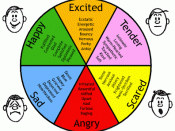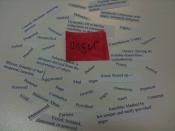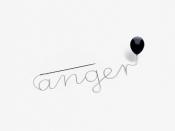For a play to be full of anger, hate and envy implies that there is no room for other emotions such as happiness, sympathy and sadness. It implies that the play revolves around hateful, angry and envious characters and that the audience feels no other emotions reflected from the characters other than hate anger and envy. This is true to some extent. In scene three of 'The Glass Menagerie' (set during a blazing row), these emotions are expressed rather vividly. Tom hates the situation he has been placed in; that is, he hates the way his life is heading. He 'would rather someone picked up a crowbar and battered out (his) brains'. The scene is constructed with these violent references to death and hurt regarding the situation he is in. Tom states that he 'envies dead people', and it is very clear that Tom and Amanda are angry with each other throughout this scene.
The stage directions are very effective in surfacing the anger in the scene, the 'violent voices', an awful voice' and speaking 'shrilly' not only tells the actor how to speak, but enhances the anger in the scene. The repeated use of verbs to describe the single emotion - anger makes clear the fact that both parties are angry. In a play centred on symbols and actions, these ingredients into the overall effect of anger on the stage will emphasise to the audience the true anger and hate in this scene. Also, the writing of words in block capitals when spoke by a character, for example, 'BUT I WONT ALLOW SUCH FILTH BROUGHT INTO MY HOUSE' mixed in with the use of italics, 'I've got no thing' is another indication to the anger that will be emphasised in the voice. Certain words that are stressed...


